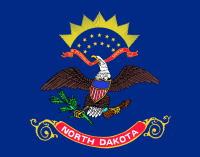North Dakota may grant human rights to individual cells

Officially, the ratio of North Dakota's flag is 33:26, but they're almost always made in the more standard 5:3 ratio
The North Dakota House of Representatives approved a bill that would grant human rights to fertilized egg cells, a move designed to challenge abortion and Roe v. Wade. The bill passed 51-41 and now moves on to the 47-member state Senate.
If passed by the Legislative Assembly and signed into law by the Governor, the bill will face a challenge in the courts, which will almost certainly declare it unconstitutional and a violation of Roe v. Wade. Critics say that defending the law in the courts will be an unnecessary expense for the state, since defeat is almost certain. The current composition of the Supreme Court, and the likely composition after any Obama appointments, make it unlikely that that tribunal would intervene to overturn its prior precedents in abortion law.
The operative text of the bill reads as follows:
References to individual, person, or human being – Legislative intent. For purposes of interpretation of the constitution and laws of North Dakota, it is the intent of the legislative assembly that an individual, a person, when the context indicates that a reference to an individual is intended, or a human being includes any organism with the genome of homo sapiens.
The measure is very similar to Colorado’s Amendment 48 (blogged about in detail here), which would have modified that state’s constitution to define a fertilized egg as a person. The people of Colorado examined the issue closely and handed Amendment 48 a huge defeat—73.3% of voters rejected it, almost a 3:1 margin.
To abortion opponents this sort of thing may sound good, but upon examination the law becomes extremely problematic. Not only abortion, but many common forms of birth control that prevent fertilized eggs from implanting in the uterus would be illegal; women on the pill could potentially be charged with murder. The law would also be likely to have a chilling effect on the medical community for various reasons.
Even if the law was a good idea, it is so likely to be struck down in the courts that passing it would amount to only a fairly costly symbolic gesture. I think the people of North Dakota have more important business for their legislators to be attending to.
Leave a comment